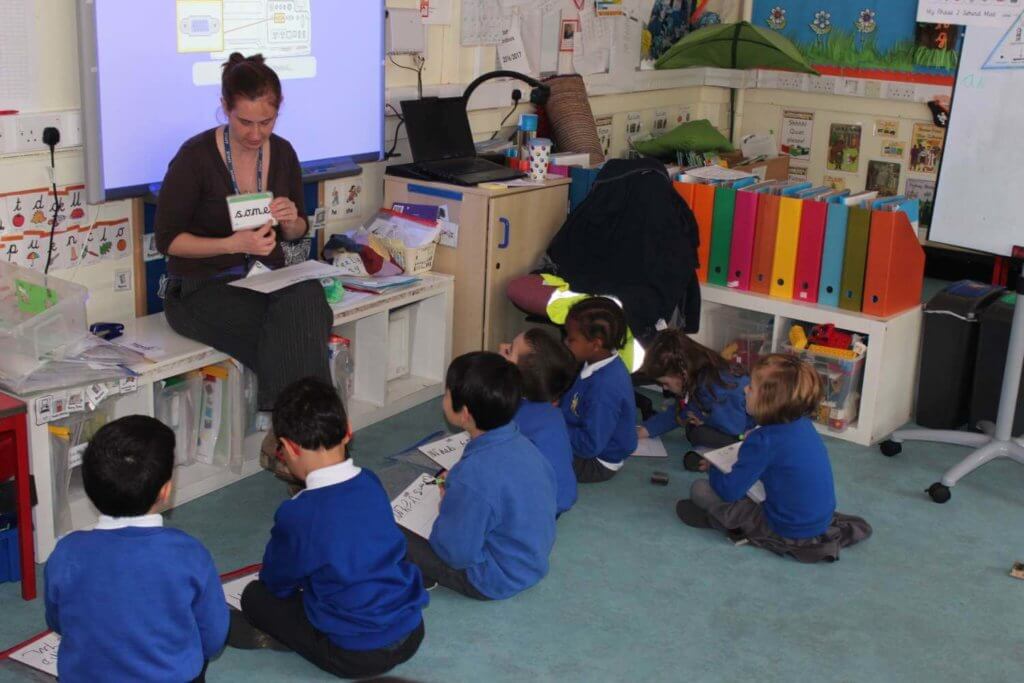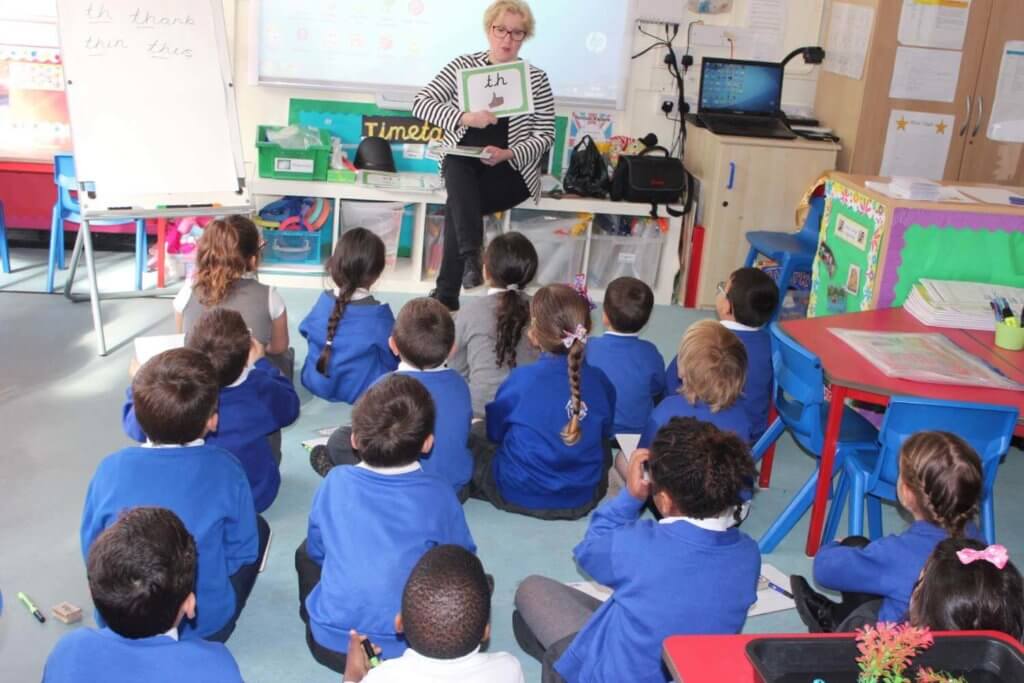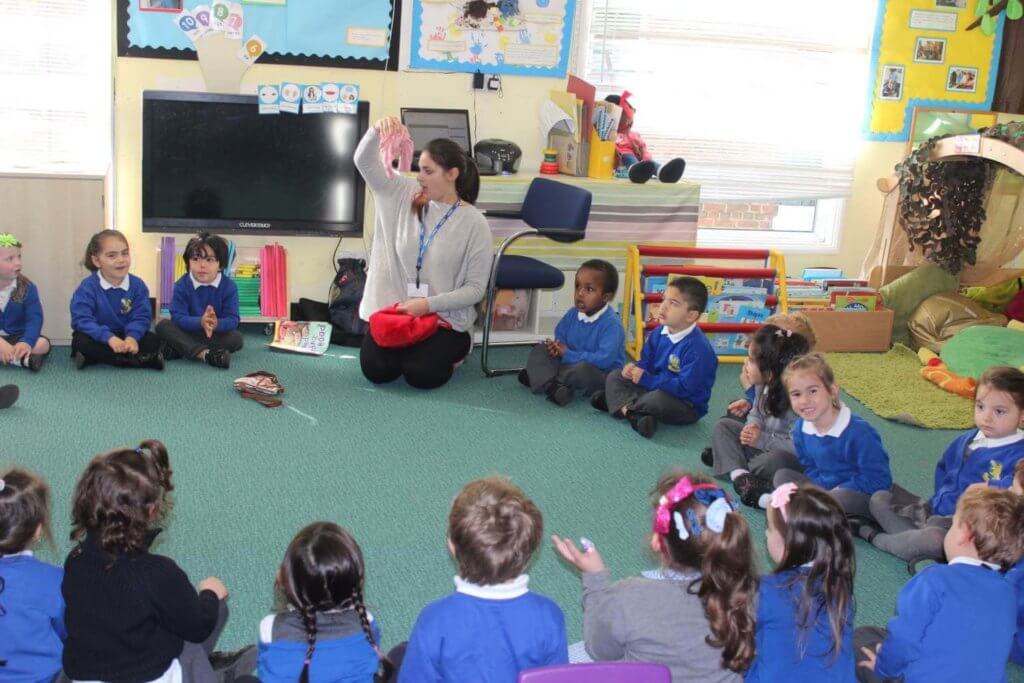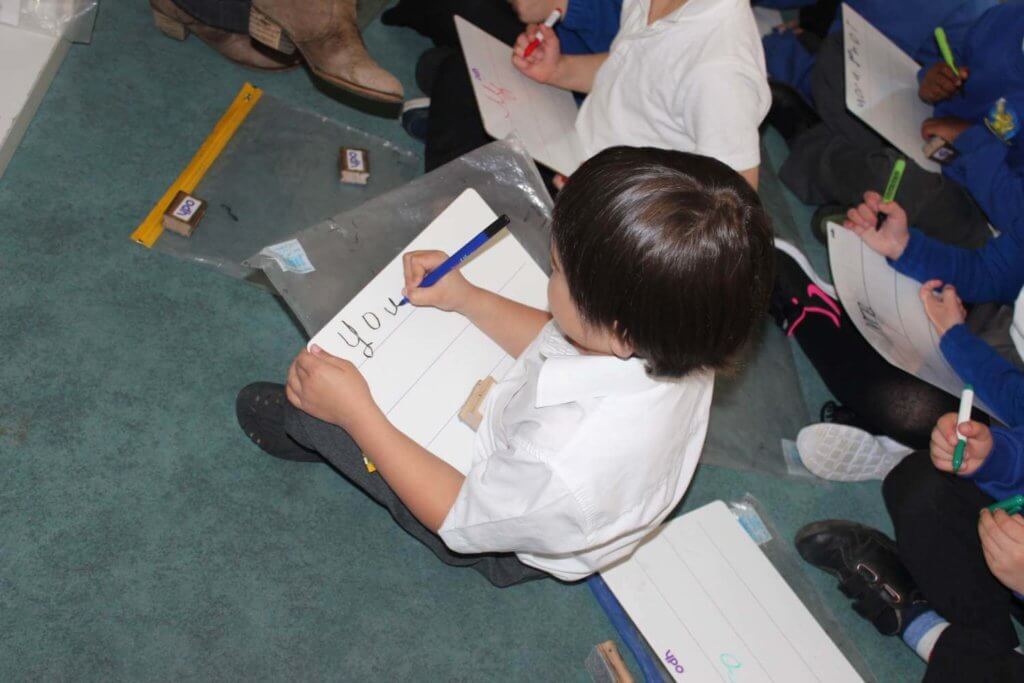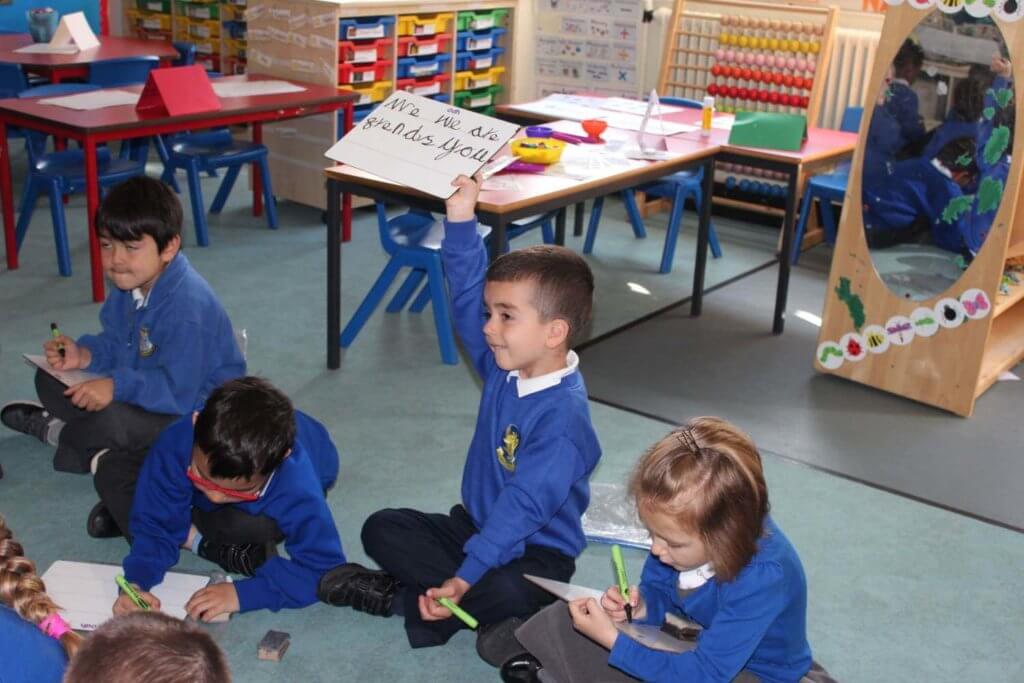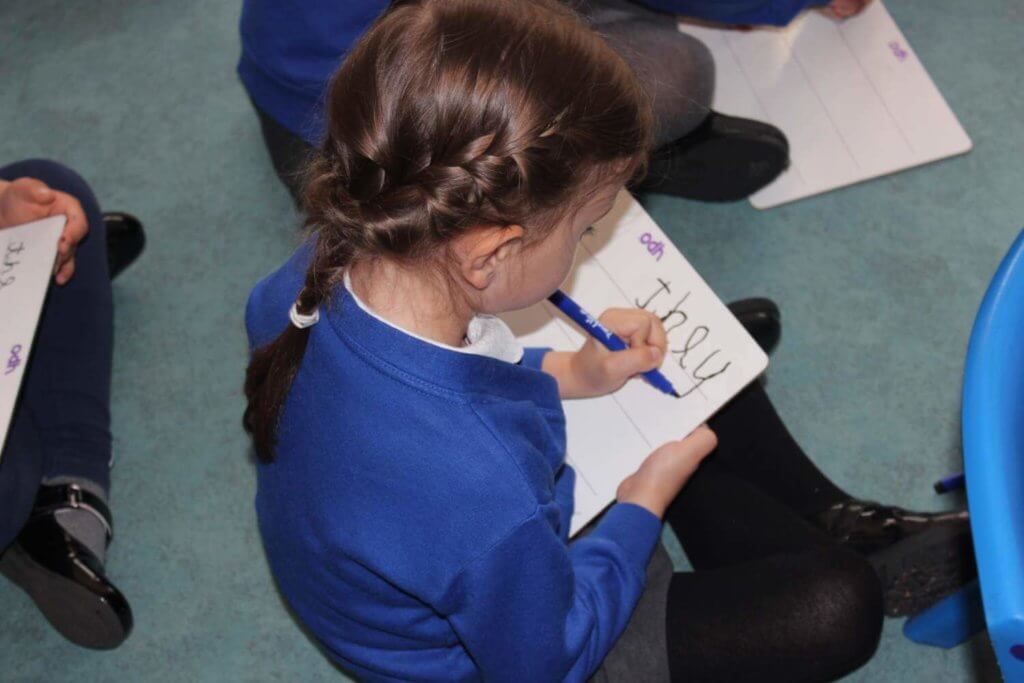Early Years
To view our EYFS Policy please click here
The Foundation Stage (Pre-school, Nursery and Reception) is based on the principle that early years’ provision should offer a sound foundation for future learning through a developmentally appropriate curriculum.
De Bohun Primary School offers a Pre-School provision for 2-3 year olds and a Nursery provision for 3-4 year olds. We understand that play is extremely important to young children and provides them with many essential skills that they will need as they grow older. It helps them to learn and develop through talking and doing. Therefore in our Pre-school and Nursery, we provide a wide range of play activities which enable the children to reach their goals and develop both physically, socially and emotionally. In some of these activities children decide how they will use the activity and in others, the adults will lead. Our daily routine allows for play and learning activities to be structured to children’s individual developmental needs. The activities for each area of learning change daily to keep children engages, stimulated and enthused. The children in our Pre-School and Nursery learn and develop very well in our safe and secure environments.
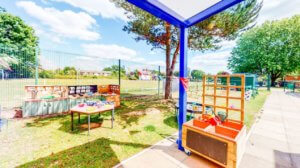
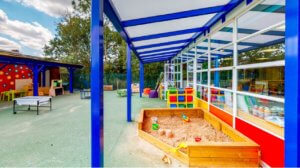
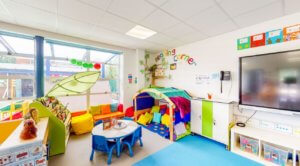
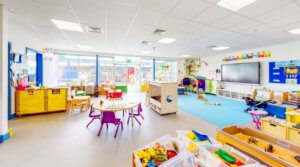
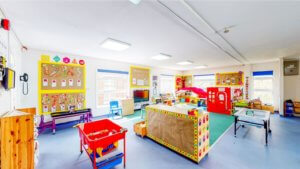
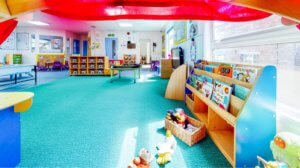
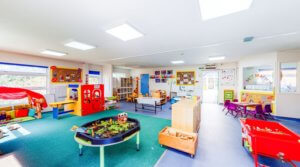
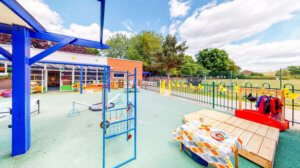
The Foundation Stage places great emphasis on children learning by doing. Young children will be given more opportunities to gain first hand experiences through play and active involvement. We effectively mix this with direct teaching to ensure you child reviews the very best provision.
Throughout the Foundation Stage the children play, make friends, develop and learn. They have great fun, exploring and creating, indoors and outside. They gain independence and confidence and their natural curiosity is encouraged at all times.
The new Early Years Foundation Stage curriculum (2012) states that:
“Each area of learning and development must be implemented through planned, purposeful play and through a mix of adult-led and child-initiated activity. Play is essential for children’s development, building their confidence as they learn to explore, to think about problems, and relate to others. Children learn by leading their own play, and by taking part in play which is guided by adults.”
The Curriculum
- The curriculum will focus on experimental learning, active involvement and developing each child’s:
- Skills and understanding.
- Personal, social, emotional, physical and intellectual well being so as to develop the whole child.
- Positive attitudes to learning so that they enjoy it and want to continue.
- Self-esteem and self-confidence to experiment, investigate, learn new things and form new relationships.
- Creative, expressive and observational skills to encourage their development as individuals with different ways of responding to experiences.
- Activities in the outdoors where they have firsthand experience of solving real life problems and learn about conservation and sustainability.
At De Bohun, children have access to a balanced curriculum that encourages them to learn through play in addition to taking part in focused activities led by specialised and experienced Early Years teachers and support staff. Each day, children are exposed to an exciting and varied timetable, which has a careful balance between children exploring and learning independently through play, and focused activities planned and led by adults. All activity that takes place is centred on the children’s interests and adults work together to plan accordingly. It is important that children are supported in Reception in order to be prepared for the transition into year 1. Towards the end of Reception, the balance will shift towards more activities led by adults, to help children prepare for more formal learning, ready for Year 1. At present we have two reception classes. There are two teachers and two Early Years practitioners in the Reception class. Other unqualified assistants (e.g. trainees and volunteers) may provide additional assistance under the supervision of qualified staff.
Please click here to view our number work in EYFS.
Please click EYFS Reading to view our reading and phonics program in EYFS.
Learning and Development
The Early Years Foundation Stage is separated into three prime areas and four specific areas. All areas of learning and development are important and inter-connected. Three areas are particularly crucial for igniting children’s curiosity and enthusiasm for learning, and for building their capacity to learn, form relationships and thrive. These three areas are the prime areas. Adults must also support children in four specific areas, through which the three prime areas are strengthened and applied.
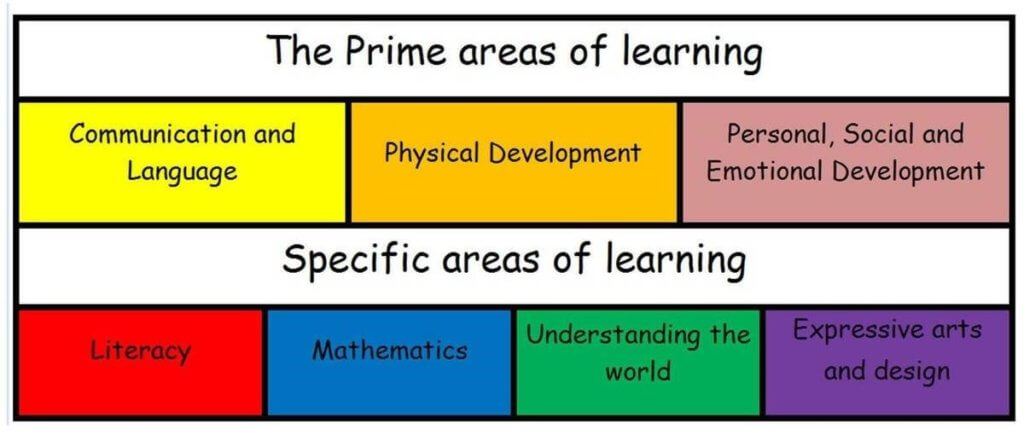
Phonics
In addition to following the Early Years Foundation Stage curriculum, at De Bohun we teach phonics through the Read, Write, Inc programme. Read Write Inc is a phonics programme which helps all children learn to read fluently and at speed so they can focus on developing their skills in comprehension, vocabulary and spelling. All children are assessed regularly by our RWInc lead teacher so they work with children at the same level. This allows complete participation in lessons.
In Nursery, children are introduced to the initial sounds in short sessions. In Reception, children have a forty five minute phonics session daily. The children start by learning Set 1 sounds by sight and how to blend them together to read words e.g. c-a-t à cat. Letter-sound pictures are used to help the children learn these sounds quickly. Once your child knows all of the Set 1 sounds and can blend them to read words, we start teaching Set 2 and then Set 3 sounds.
Developing the Home-School Partnership
We believe that parents and carers are the child’s first and most enduring educators. We try to work with them as partners in their children’s learning. We try to develop a close working relationship between home and school involving parents in their child’s development as much as possible. Some of the ways we encourage this are:
- Parents and teachers have the chance to chat informally at the beginning or end of the school day. Parents are welcome to make appointments at any time if they wish to discuss anything in greater detail or privacy.
- Involving parents and carers as helpers for regular classroom activities and for special events such as visits to the local area.
- Support and advice is available regularly for parents of children with special needs.
- Parents are welcomed into classrooms to read stories in their home languages, or teach children traditional songs, poems or dances.
- The Friends of De Bohun welcome help from all parents.
- Parents are invited to reading, phonics and maths workshops throughout the year to learn how to support their child at home.
- Parents are invited to watch children perform class assemblies, concerts and other performances throughout the year.
- Parents can access their child’s online observation profile at home and receive regular updates.
- Children in Pre-School and Nursery have a home/school liaison book which goes home once a month. Special drawings, photos and cut outs are kept in the book. Parents are encouraged to add comments, photos and any work from home.
- Children in Reception have a home/school link folder which goes home once per week. The folder includes work for the children to complete, messages for parents, updates from the children’s learning that week and a space for parents to leave comments and questions.
Links with the Community and Other Agencies
We use the opportunities offered by the local community in the following ways:
- Exploring the grounds of the school and immediate area, visiting local shops and other attractions;
- Visits from people in the locality who come to talk to the children (police, fire, nurses, parents, etc).
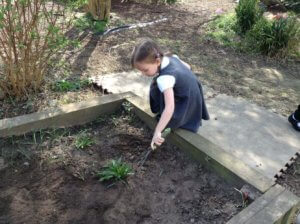
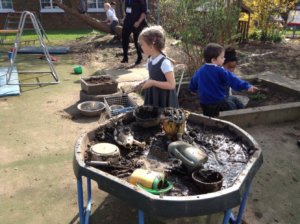
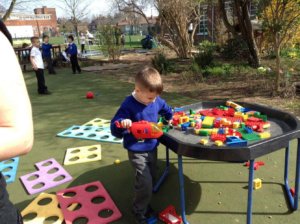
Assessment
In our Early Years settings colleagues record observations using Target Tracker Link. These observations inform planning and assessments in relation to the Early Years Foundation Stage Profile. Parents and carers are provided with training to access Target Tracker Link at home.
Literacy and maths books in Reception are also used to inform assessments along with phonic and maths passports.
Each child has an assessment folder which includes an individual Development Matters profile and assessment tracking grids to show where each individual child is in their learning journey.
When your child starts with us, they will be assigned a key person who will make sure that their learning and care is tailored to meet their individual needs.
The key person will look, listen and note how they play and then build on this by planning a challenging environment to support your child’s development. You can also share what you see your child doing with their key person. They can also share ideas about supporting your child at home.
At the end of your child’s Reception year, they will be assessed using the Early Years Foundation Stage Profile.
The Early Years Foundation Stage is separated into three prime areas and four specific areas. All areas of learning and development are important and inter-connected. Three areas are particularly crucial for igniting children’s curiosity and enthusiasm for learning, and for building their capacity to learn, form relationships and thrive. These three areas are the prime areas. Adults must also support children in four specific areas, through which the three prime areas are strengthened and applied.

This will assess your child’s development against 17 early learning goals which are linked to the goals in “Development Matters in the Early Years Foundation Stage” between the ages of 40 and 60 months. For further information please visit this website.





